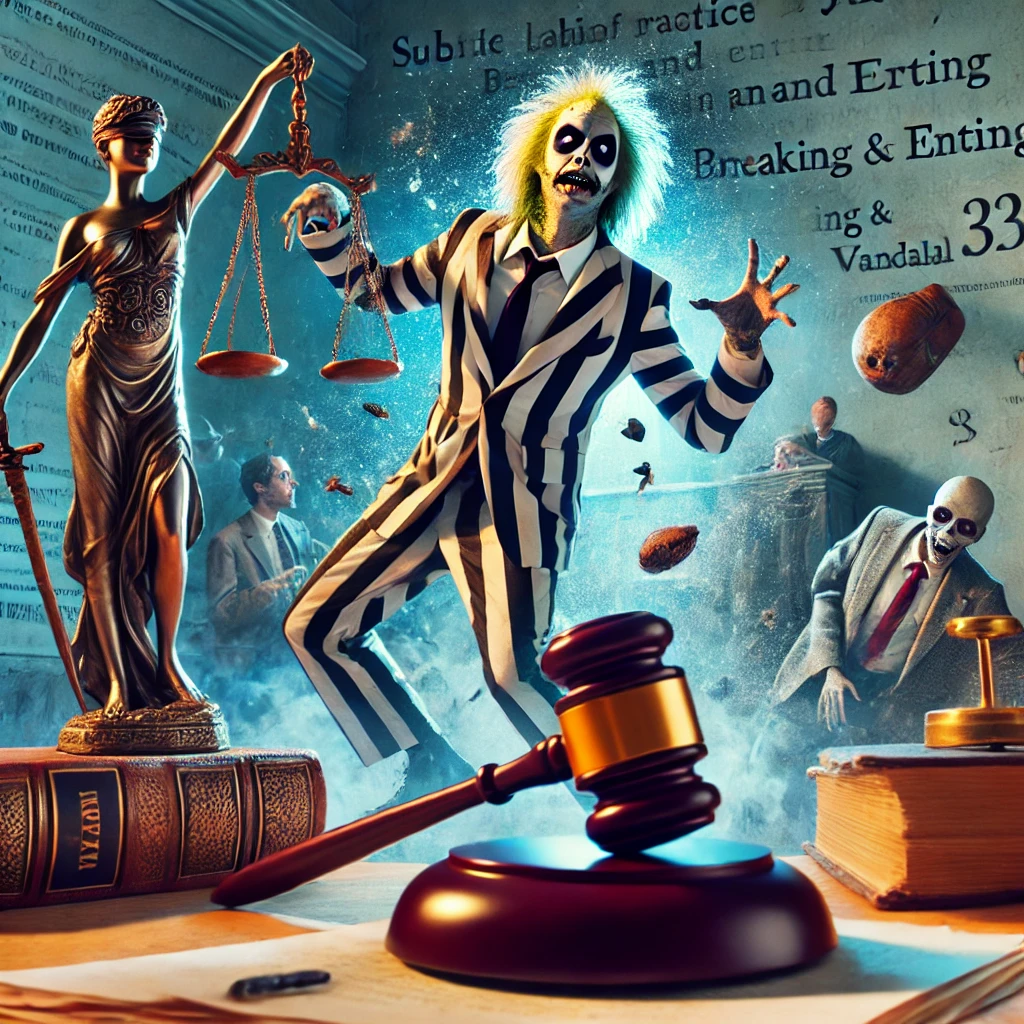Beetlejuice is a 1988 dark comedy that follows a recently deceased couple, the Maitlands, as they enlist the help of a mischievous ghost named Beetlejuice to scare away the new occupants of their home. While the movie is filled with supernatural humor and quirky characters, many of the actions depicted would raise significant legal issues if they occurred in real life. This article examines the key crimes committed in Beetlejuice and analyzes how these actions would be treated under Washington State law.
1. Unauthorized Practice of Exorcism (RCW 18.71.011)
Beetlejuice, who acts as a freelance bio-exorcist, offers his services to the Maitlands to rid their home of the living. In Washington, practicing any form of exorcism or similar service without proper credentials could be illegal under RCW 18.71.011, which governs the unauthorized practice of medicine. Although Beetlejuice is a ghost, if such activities were conducted by a living person without proper licensing, it could lead to criminal charges for practicing medicine without a license—a serious offense under Washington law.
2. Fraud and Deception (RCW 9A.60.040)
Beetlejuice engages in various forms of deception throughout the film, including impersonating different individuals and misleading the Deetz family. In Washington, fraud is addressed under RCW 9A.60.040, which defines false representation or impersonation as a crime. If Beetlejuice’s actions were committed by a living person, they could be considered fraudulent, leading to potential criminal charges.
3. Breaking and Entering (RCW 9A.52.025)
The Maitlands and Beetlejuice enter the Deetz family’s home without permission on several occasions. While the Maitlands are ghosts and their presence might be seen as a haunting rather than a physical crime, Beetlejuice’s more tangible interactions with the house could be considered breaking and entering under RCW 9A.52.025. Breaking and entering is classified as second-degree burglary in Washington, a class B felony punishable by up to 10 years in prison and significant fines.
4. Harassment (RCW 9A.46.020)
Beetlejuice’s actions throughout the movie, including scaring and harassing the Deetz family, could be classified as criminal harassment under Washington law. RCW 9A.46.020 defines harassment as knowingly threatening to cause bodily injury, damage property, or substantially harm someone’s mental health. If Beetlejuice were a living person, his actions could lead to harassment charges, typically gross misdemeanors, but could be elevated to a felony under certain conditions.
5. Assault (RCW 9A.36.011)
Beetlejuice engages in physical altercations with various characters, including attempts to harm the Deetz family with his supernatural abilities. In Washington, assault is defined under RCW 9A.36.011 as intentionally causing bodily harm to another person. Depending on the severity of the actions, Beetlejuice’s conduct could be classified as first-degree assault, a class A felony punishable by life imprisonment.
6. Kidnapping (RCW 9A.40.020)
In a pivotal scene, Beetlejuice attempts to marry Lydia Deetz, essentially holding her against her will to force the marriage. Under Washington law, this could be classified as kidnapping, defined under RCW 9A.40.020 as intentionally abducting another person with the intent to inflict bodily injury or to facilitate the commission of a felony. Kidnapping in the first degree is a class A felony, carrying severe penalties, including life imprisonment.
7. Vandalism (RCW 9A.48.090)
Beetlejuice causes significant property damage throughout the film, including altering the Maitlands’ model of the town and wreaking havoc in the Deetz home. In Washington, this could be classified as malicious mischief or vandalism under RCW 9A.48.090, a gross misdemeanor if the damage is under $750 but could be elevated to a felony if the damage exceeds this amount.
Conclusion
While Beetlejuice is a dark comedy filled with supernatural humor, many of the actions depicted in the film would raise significant legal issues under Washington State law. From unauthorized practice and fraud to breaking and entering, harassment, assault, kidnapping, and vandalism, these offenses could lead to serious criminal charges if committed in real life. Analyzing the movie through a legal lens underscores the importance of understanding and adhering to the law, even in the realm of the supernatural.
Review our client resources here
Contact us anytime for your urgent legal needs.
About Blanford Law:
We are no-nonsense, relentless, fair, and honest. We are great listeners instead of fast talkers, that is just who we are. More than 20 years ago, Ken began practicing law with a deeply-seeded belief that every person has the right to the best legal representation available. He built his law firm on that belief. Another belief that he strongly adheres to is his fundamental belief that clients deserve respect, with no assumptions or preconceived notions. If you or someone you know is accused of a crime or injured as a result of the negligence of another, please have them call us at 253-720-9304 or email us info@blanfordlaw.com

